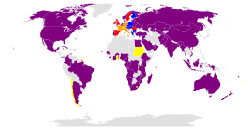Cape Town Convention
| Cape Town Convention on International Interests in Mobile Equipment | |
|---|---|

Parties
Signatories
Parties, also covered by EU's accession
Signatories, also covered by EU's accession
covered by EU's accession
|
|
| Signed | 16 November 2001 |
| Location | Cape Town, South Africa |
| Effective | 1 March 2006 |
| Condition | 3 ratifications |
| Parties | 72 |
| Depositary | International Institute for the Unification of Private Law |
| Citations | 2307 U.N.T.S. 285 |
| Languages | English, Arabic, Chinese, French, Russian and Spanish |
|
|
|
The Cape Town Convention on International Interests in Mobile Equipment, or Cape Town Treaty is an international treaty intended to standardize transactions involving movable property. The treaty creates international standards for registration of contracts of sale (including dedicated registration agencies), security interests (liens), leases and conditional sales contracts, and various legal remedies for default in financing agreements, including repossession and the effect of particular states' bankruptcy laws.
Three protocols to the convention are specific to three types of movable equipment: Aircraft Equipment (aircraft and aircraft engines; signed in 2001), railway rolling stock (signed in 2007) and space assets (signed in 2012).
The treaty resulted from a diplomatic conference held in Cape Town, South Africa in 2001. The conference was attended by 68 countries and 14 international organizations. 53 countries signed the resolution proposing the treaty . The treaty came into force on 1 April 2004 , and has been ratified by 57 parties. The Aircraft Protocol (which applies specifically to aircraft and aircraft engines ) took effect on 1 March 2006 when it was ratified by 8 countries: Ethiopia, Ireland, Malaysia, Nigeria, Oman, Panama, Pakistan, and the United States.
As of July 2015, the convention has been ratified by 64 states as well as the European Union. The railway rolling stock and the space protocols have been ratified by respectively two countries (Luxembourg and Gabon), as well as the European Union, and no countries and thus have not taken effect. An overview of the status of the treaty and protocols is shown below:
In the United States, the treaty was approved by the U.S. Senate in 2003, and implemented by the full Congress in the Cape Town Treaty Implementation Act of 2004.
...
Wikipedia
